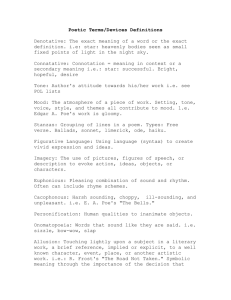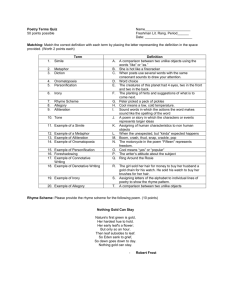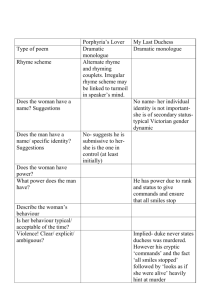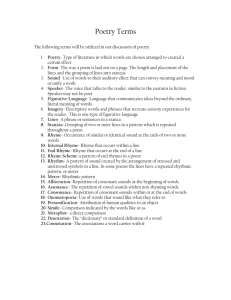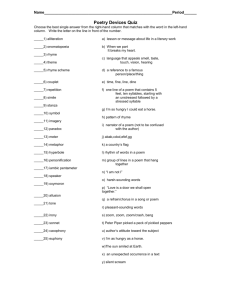"The Broken-Legg'd Man" by John Mackey Shaw
advertisement
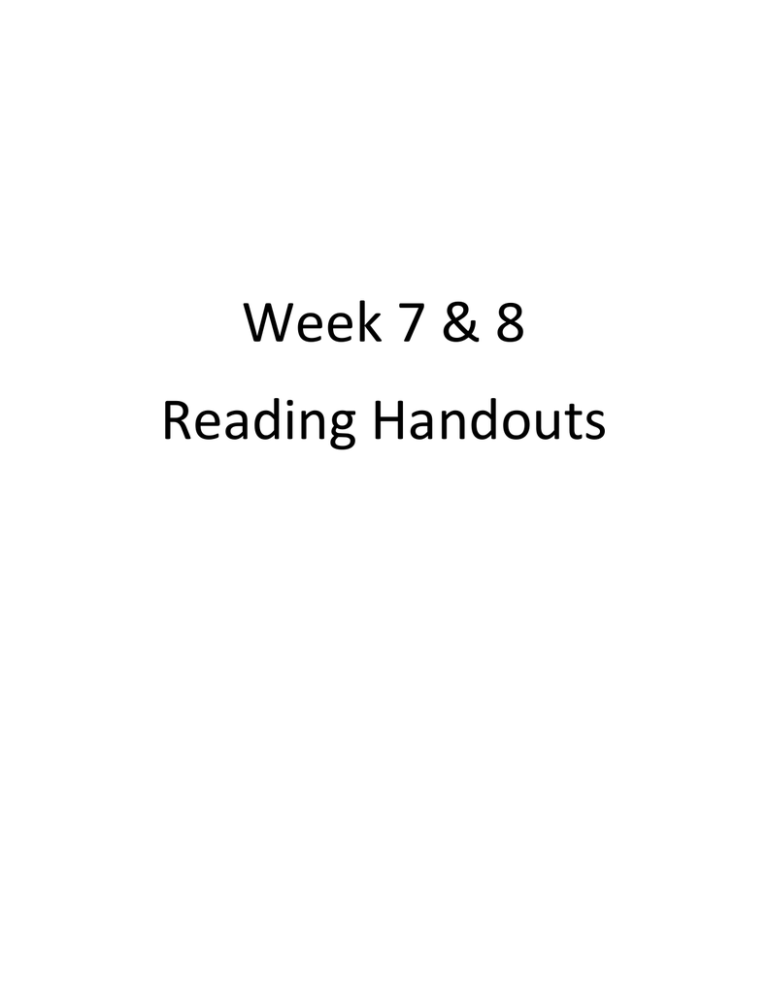
Week 7 & 8 Reading Handouts Poetry – is a piece of writing in which words and their sounds are used to show images and express feelings and ideas. Noticings Author’s Purpose: to entertain or express Form: includes free verse, narrative, lyrical, and haiku Stanzas: the sections of a poem; a stanza may focus on one central idea or thought; lines in a stanza are arranged in a way that looks and sounds pleasing Book Examples Author’s Purpose: to entertain the reader with a funny poem that tells the story about a how a man lost his leg Form: narrative poem Stanzas: I saw the other day when I went shopping in the store A man I hadn't ever, ever seen in there before, A man whose leg was broken and who leaned upon a crutchI asked him very kindly if it hurt him very much. "Not at all!" said the broken-legg'd man. Rhyme: words that have the same ending sound may be used at the ends of lines to add interest to the poem and to make it fun to read I ran around behind him for I thought that I would see The broken leg all bandaged up and bent back at the knee; But I didn't see the leg at all, there wasn't any there, So I asked him very kindly if he had it hid somewhere. "Not at all!" said the broken-legg'd man. Rhyme: I ran around behind him for I thought that I would see The broken leg all bandaged up and bent back at the knee; But I didn't see the leg at all, there wasn't any there, So I asked him very kindly if he had it hid somewhere. "Not at all!" said the broken-legg'd man. Poetry – is a piece of writing in which words and their sounds are used to show images and express feelings and ideas. Noticings Rhythm: the beat of how the words are read; Add these to anchor chart on Friday may be fast or slow Sound Effects: Repetition occurs when poets repeat words, phrases, or lines in a poem to create a pattern, increase rhythm, and strengthen feelings, ideas and mood in a poem. Rhyme Scheme the pattern of rhyme that the poet uses Alliteration the repetition of the first consonant sound in words, as in the nursery rhyme “Peter Piper picked a peck of pickled peppers.” Book Examples Rhythm: The pickety fence The pickety fence Give it a lick it's The pickety fence Give it a lick it's A clickety fence When the night begins to fall And the sky begins to glow You look up and see the tall City of lights begin to grow – Repetition Someone tossed a pancake, A buttery, buttery, pancake. Someone tossed a pancake And flipped it up so high, That now I see the pancake, The buttery, buttery pancake, Now I see that pancake Stuck against the sky. actual sound of something are words of onomatopoeia. Thunder “booms,” rain “drips,” and the clock “ticks.”Appeals to the sense of sound. Imagery & Sensory Detail the use of Add on Monday to create images, or “paint pictures,” in your mind. Rhyme Scheme Alliteration Onomatopoeia Simile compares two things using the Imagery & Sensory Detail: Add on Tuesday Figurative Language tools that writers use words “like” or “as.” Metaphors compare two things without using the words “like” or “as.” Personification gives human traits and feelings to things that are not human – like animals or objects. The rhythm in this poem is slow – to match the night gently falling and the lights slowly coming on. Sound Effects: Onomatopoeia words that represent the words to create pictures, or images, in your mind. Appeals to the five senses: smell, sight, hearing, taste and touch. The rhythm in this poem is fast – to match the speed of the stick striking the fence. Figurative Language: Simile Metaphors Personification see specific anchor charts for examples Topic: State Fair Read the State Fair poem. Use this graphic organizer to collect sensory language that helps the reader create imagery. See Hear Smell Taste Feel Feelings State Fair The energy— thousands of people swarming about Moms pushing strollers couples holding hands teenagers bored with excitement kids running back and forth, around in circles laughing screaming, hot and sweaty. Everything at once— auto show carmel apples, nachos farm animals extreme rides squeal in delight “Announcing! The beginning of a show!” ice cream cone, funnel cake BMX bike show pig races spin the wheel toss the rings shoot the ball “I won! I won!” stuff the Snoopy under my arm chili and cheese fries Texas Skyway thirsty, dusty and dirty. Eyes wide open— Big Tex smiles and waves “Howdy Folks!” cotton candy, corn dogs each ride sings its own music Ferris Wheel stops at the top “Hurry! Hurry! Step right up!” sticky and sunburned. Long day ending— one more ride on the carousel, enough of the fried food the sweet cakes, the voices and laughter of a thousand people fading away, slowing down, dragging feet, dragging Snoopy, hot and sweaty, sticky, sunburned, dusty, dirty, “Where’s the car?” Topic: State Fair ***The highlighted Sensory Details are the ones you can use for modeling during your Minilesson. See Hear Smell Big Tex Ferris Wheel Thousands of people Auto Show Bike Show Farm Animals Crafts Rides – Texas Skyway, Extreme Rides, Carousel Games “Hurry, hurry! Step right up!” People laughing People screaming (on rides) Music playing An announcer shouting the beginning of a performance Everything is loud Fried food Sweet cakes Beer Animal smells in the barns Straw in the barns Taste Feel Feelings Cotton Candy Corn Dogs Ice Cream Cones Funnel Cakes Soda Carmel Apples Nachos Chili & Cheese Fries Hot Sweaty Sticky Sun burned Dusty Dirty Excited Lots of energy Want to do everything at once Eyes are wide Figurative Language Type of Figurative Language Simile Metaphor Idiom Definition Example Comparison of 2 things using like or as The emerald is as green as grass. The night is a big, black cat. Comparison of 2 things but does not use like or as Phrase that has a figurative meaning She’s pulling my leg. He laughed his head off. Figurative Language Type of Figurative Language Simile Definition Comparison of 2 things using like or as Metaphor Comparison of 2 things but does not use like or as Idiom Phrase that has a figurative meaning Example Big Bully Joe by Arden Davidson Big Bully Joe is a kid I know who’s as mean as a grizzly bear. He’s tall and he’s strong. We just don’t get along. There’s not one thing in common we share. When a baby’s diaper falls off, you know Joe took out the pins. Joe likes to torture little ones that’s how he gets his grins. When there’s gum in someone’s hair, you know it’s Joe who blew the bubble. When the teacher shouts “who did this?” you know Big Joe’s in big trouble. When a food does not agree with Joe he argues till he wins. He likes to fight. He also likes to kick dogs in their shins. He calls out horrid names to kids just doing their own thing. If he saw an injured bird, he’d likely break it’s other wing. Big Bully Joe is a kid I know who doesn’t have one single friend. But I heard Kelly Mayer put a tack on his chair. Guess he’ll pay for it all in the end! What it Looks Like on a Test… Read line 8 the poem ___________________________________________ ___________________________________________ The poet uses this line to show that the speaker is – 3.10/Fig 19D Read lines 15 and 16 from the poem The poet uses these lines to show- 3.10A What it Looks Like on a Test… Which of these lines from the poem rhyme? 3.6A Why does the poet use the exclamation points in the first stanza? How does the speaker feel throughout the poem? Read the lines 17 and 18 from the poem. These lines best support the idea that the speaker- 3.6/Fig19D "The Broken-Legg'd Man" by John Mackey Shaw I saw the other day when I went shopping in the store A man I hadn't ever, ever seen in there before, A man whose leg was broken and who leaned upon a crutchI asked him very kindly if it hurt him very much. "Not at all!" said the broken-legg'd man. I ran around behind him for I thought that I would see The broken leg all bandaged up and bent back at the knee; But I didn't see the leg at all, there wasn't any there, So I asked him very kindly if he had it hid somewhere. "Not at all!" said the broken-legg'd man. "Then where," I asked him, "is it? Did a tiger bite it off? Or did you get your foot wet when you had a nasty cough? Did someone jump down on your leg when it was very new? Or did you simply cut it off because you wanted to?" "Not at all!" said the broken-legg'd man. "What was it then?" I asked him, and this is what he said: "I crossed a busy crossing when the traffic light was red; A big black car came whizzing by and knocked me off my feet." "Of course you looked both ways," I said, "before you crossed the street." "Not at all!" said the broken-legg'd man. "They rushed me to the hospital right quickly, "he went on, "And when I woke in nice white sheets I saw my leg was gone; That's why you see me walking now on nothing but a crutch." "I'm glad," said I, "you told me, and I thank you very much!" "Not at all!" said the broken-legg'd man. For hours and hours they let it cook. It swelled inside till the windows shook. It was piping hot when they took it out, And the villagers raised a mighty shout. "Isn't it crusty, Aren't we clever!" But the wasps were just as bad as ever. The loaf was left to cool, and then TI1e people watched while six strong men Took a great big saw and sliced right through. Everybody clapped, and they cut slice two. Think Aloud 2 wonder how they are going to get the bread to Farmer Seed's field? Maybe they will put it on a truck. / The village bus, they all agreed, Would spoil the fields of Farmer Seed, So eight fine horses pulled the bread To where the picnic cloth was spread.2 A truck drew up and dumped out butter, And they spread it out with a flap and a flutter. Spoons and spades! Slap and slam! And they did the same with the strawberry jam. Meanwhile, high above the field, Six flying machines whirred and wheeled, Ready for the wasps to take the bait. And then there was nothing to do but wait. Suddenly the sky was humming! All four million wasps were coming! They smelled that jam, they dived and struck! And they ate so much that they all got stuck. The other slice came down-kersplat!On top of the wasps, and that was that. There were only three that got away, And where they are now I cannot say. 126 Poetry Elements: Rhythm and Sound Effects Sound Effect Rhyme Scheme Alliteration Onomatopoeia The pattern of rhyme that the poet uses The repetition of the first consonant sound in words, as in the nursery rhyme “Peter Piper picked a peck of pickled peppers.” Definition Words that represent the actual sound of something are words of onomatopoeia. Thunder “booms,” rain “drips,” and the clock “ticks.” Appeals to the sense of sound. AABB Rhyme Scheme Snow makes whiteness where it falls. A The bushes look like popcorn balls. A And places where I always play, B Look like somewhere else today. B Example ABAB Rhyme Scheme I love noodles. Give me oodles. Make a mound up to the sun. Noodles are my favorite foodles. I eat noodles by the ton. A B A B ABBA Rhyme Scheme Let me fetch sticks, Let me fetch stones, Throw me your bones, Teach me your tricks. A B B A I jiggled it jaggled it jerked it. I pushed and pulled and poked it. But – As soon as I stopped, And left it alone This tooth came out On its very own! Scrunch, scrunch, scrunch. Crunch, crunch, crunch. Frozen snow and brittle ice Make a winter sound that’s nice Underneath my stamping feet And the cars along the street. Scrunch, scrunch, scrunch. Crunch, crunch, crunch. Poetry Elements: Rhythm and Sound Effects Sound Effect Definition Rhyme Scheme Alliteration Onomatopoeia The pattern of rhyme that the poet uses The repetition of the first consonant sound in words, as in the nursery rhyme “Peter Piper picked a peck of pickled peppers.” Words that represent the actual sound of something are words of onomatopoeia. Thunder “booms,” rain “drips,” and the clock “ticks.” Appeals to the sense of sound. Example Canoeing Adapted from STAAR Ready The river water, smooth as glass, stretches on ahead, I might almost be asleep, Floating on a cloud, drifting lazily down the river. But suddenly a roar; rapids are all around me. 5 The calm river, now furious, thrashes like an angry animal. Now, my paddle slices through the boiling water like a knife, And I lead my canoe back into still waters. The Clock Adapted from STAAR Ready Tick tock! Tick tock! The second hand beat. I looked at the clock and I wiggled my feet. “The time!” I thought. “It’s going away fast,” And just in that time, ten more seconds passed. 5 On this spelling test, I thought I’d do well, But, Mississippi was really hard to spell! Mary’s Great Fright! Adapted from STAAR Ready I once knew a young man named Bobby, who had a very unsusal hobby. On his shelf he had jars filled with bugs from the car’s 5 windshields where he’d found them all blobby. We all liked Mary, his wife, whose mind was as sharp as a knife. But one summer’s night she had such a fright: 10 Bobby’s bugs all came back to life! Oh, how loud Mary screamed, Her voice a siren beamed so loud it woke neighbors both big and small. But when her eyes opened, she realized it all 15 was just something crazy she dreamed. Bed in Summer By Robert Louis Stevenson In winter I get up at night And dress by yellow candlelight In summer, quite the other way, I have to go to bed by day. 5 I have to go to bed and see The birds still hopping on the tree, Or hear the grown-up people’s feet Still going past me in the street. And does it not seem hard to you, 10 When all the sky is clear and blue, And I should like so much to play, To have to go to bed by day?
